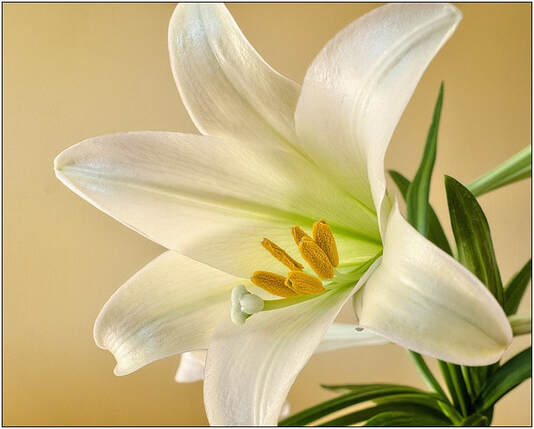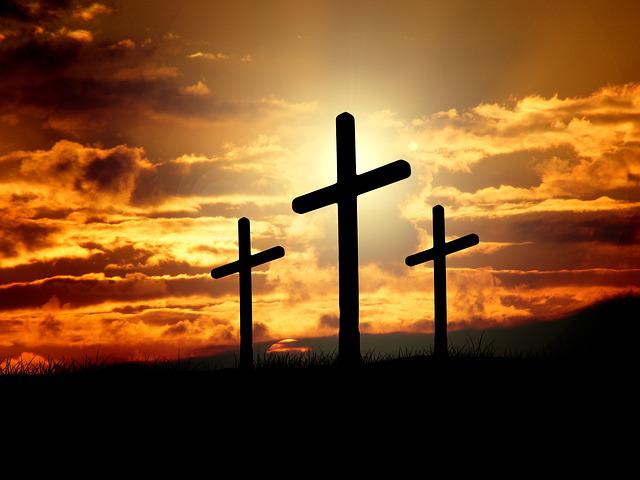|
Maundy Thursday begins our trek to Eastertide with poignant organ works from Olivier Messiaen, Ronald Perera, and Ludwig Lenel joined by cellist Lucas Jackson. The Chancel Choir offers a setting of the ancient Latin hymn "Ubi caritas et amor, Deus ibi est" (Where charity and love are, God is there) traditionally sung at Maundy Thursday liturgies.
The Good Friday Musical Meditation and Reflection provides a quiet space on this solemn day of the liturgical year. Organ works by Johannes Brahms, Pamela Decker, Jeanne Demmesieux, Aulis Sallinen and Taizé chants of Passiontide will be shared. Cantor Lucas Jackson and violinist Harmony Tucker join us as we bring our Lenten journey to a close. Easter joy will be offered in an eclectic array of musical expressions this weekend. At the Prelude, trumpeters Michael Bucalo and Josh Margheim join the organ in a transcription of "My Spirit Be Joyful" from J.S. Bach's Easter Cantata No. 146 by Christina Harmon and a fanfare by Martin Ellis. The Chancel Choir sings the rousing gospel-influenced anthem "Love Brought Me Back" by Mark Miller. During communion, the Plymouth Ringers offer a moment of joyful reflection — a quiet joy — in "Easter Sunrise: A Meditation" by Kristine Johanek followed by the exuberant "Jesus Christ Is Risen Today, Alleluia!" by Dianna Meux. At the Postlude, the organ offers "Acclamations", the final movement from "Suite Médiévale" by 20th century French composer Jean Langlais. Based on the Gregorian hymn "Christus vincit" (Christ victorious), the work is an expression of ecstatic joy and triumph bringing our Easter Sunday celebration to a resounding close.
0 Comments
The Triduum begins with an agape meal and service of Tenebrae this Maundy Thursday.evening. Organ works by Olivier Messiaen and Jehan Alain will be offered along with a poignant setting of the spiritual "Were You There?" by Bob Chilcott from the Chancel Choir. Cellist Aaron Dunigan-AtLee also joins us for this poignant service of communion and shadows.
On the solemn feast day of Good Friday, a time for prayer, reflection and meditation will be presented with the organ repertoire of Passiontide by composers J.S. Bach, Johannes Brahms, Jean Langlais, and Arvo Pärt. Easter Sunday morning begins with the joyful strains of the Plymouth Brass ensemble. The Chancel Choir offers the Southern Harmony-influenced anthem "Tell the News!" by David Ashley White. The Plymouth Ringers offer a quiet joy during communion time with Eastertide meditations and carols. The organ closes our Paschal celebration with the riveting "Final from Organ Symphony No. 1" by titular organist and composer of Notre Dame Cathedral (1900-1937) Louis Vierne. Music of Passiontide and the Paschal season as we journey through the Triduum and, at long last, arrive at Easter Sunday.
The Maundy Thursday Tenebrae Service begins with a mystical ode to the mysteries of the Eucharist in Olivier Messaien's "Le Banquet Céleste" (the celestial banquet). The Chancel Choir offers "What Wondrous Love Is This" in a contemplative setting by Peter Stearns. Lenten chants from the Taizé tradition will be beautifully embellished with vocal and instrumental descants by members of the Chancel Choir and violinist Harmony Tucker and cellist Aaron Dunigan-Atlee. On Good Friday, we reflect on the ministry of Jesus and the crucifixion in a time of readings, scripture, prayer, and music of Passiontide from the organ. Works by Jehan Alain, J.S. Bach, Johannes Brahms, Pamela Decker, Jeanne Demessieux, and Ludwig Lenel will be prayerfully offered. On Easter Sunday we celebrate the resurrection with a joyful musical potpourri featuring the Plymouth Brass, Plymouth Ringers, Chancel Choir, and the roar of the organ! Easter carols will be aplenty including two settings of the Palestrina tune "Victory" (most associated with the text "The Strife Is O'er, the Battle Done") for brass quintet and organ and my own arrangement for handbells at communion — a gentle fanfare expressing Easter's accompanying quiet joy and assurance. The Chancel Choir offers the simple message of "Christ Jesus Is Arisen" in a Renaissance-inspired arrangement by Michael Burkhardt. Finally, the Easter celebration closes with the ecstatic expression of exhilarating joy in Jean Langlais' "Acclamations," the final movement of his "Suite Médiévale" based on the two-note motif of the Gregorian Chant "Christus Vincit" (Christ victorious.)  By GunnerVV - Easter Sunrise 2011, CC BY 2.0, https://commons.wikimedia.org/w/index.php?curid=21211093 By GunnerVV - Easter Sunrise 2011, CC BY 2.0, https://commons.wikimedia.org/w/index.php?curid=21211093 Expressions of the Triduum from the German Baroque era and ethereal sonorities from 20th century French composers greet us this Maundy Thursday. The impressionistic work "Le Banquet Céleste" (The Heavenly Feast) by Olivier Messiaen begins the service as a musical paraphrase of the eucharistic text John 6.56: "Whoever eats my flesh and drinks my blood remains in me, and I in them." Cellist Heidi Mausbach joins us for the restless and surreal second movement of Sonata in A Minor for cello and organ by Marcel Dupré. With soprano Blair Carpenter, the sublime "Pie Jesu" from Maurice Duruflé's Requiemwill be offered. Additional works by J.S. Bach, Ronald Perera, Jean Langlais, and Jehan Alain bring this holy night to a tranquil and reflective space of repose. On Good Friday, a meditation though music, prayer, scripture, and poetry will be offered at noon. Rev. Jane Anne Ferguson will weave in stories of this holy day with musical expressions from the organ contributing their own tales. Repertoire spanning the centuries including J.S. Bach, Johannes Brahms, Helmut Walcha, and Ludwig Lenel provide you with an inviting template to contemplate the life and death of Christ. In closing, a setting by Jeanne Demessieux on the Good Friday text "In Manus Tuas" (Into your hands, O Father, I commend my spirit) concludes this prayerful time. The Plymouth Brass returns this Easter Sunday to lead our hymn singing and share joyful works of the Paschal season by G.F. Handel and Johann Crüger. The ecstatic joy of Jean Langlais' "Acclamations" from Suite Médiévale closes the Easter celebration in triumph: Christus vincit. |
Details
|




 RSS Feed
RSS Feed